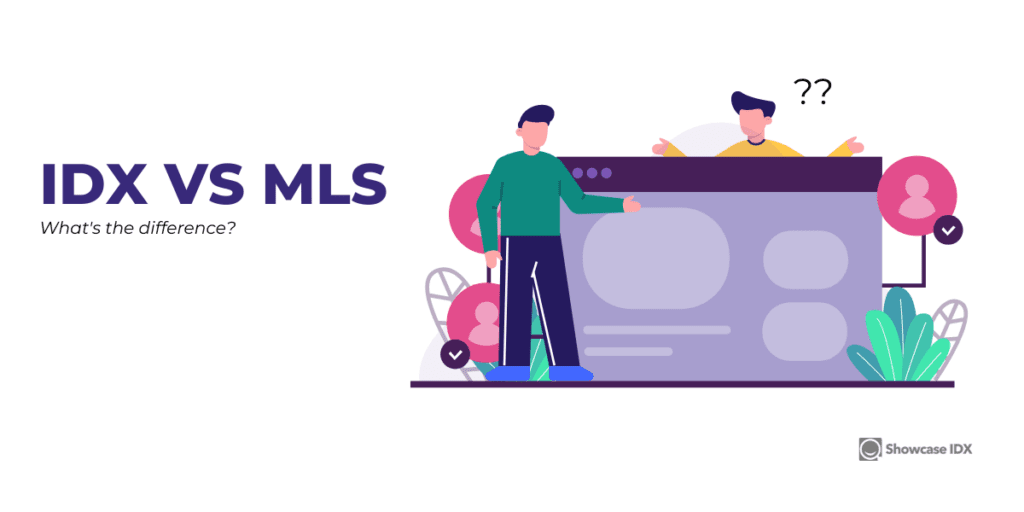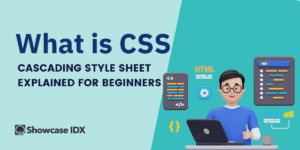As the real estate industry has developed and evolved over time, the way that real estate agents have accessed and shared listings with their clients has changed with it. What began with agents coming together in one room and sharing listings has developed into a convenient and accessible process of acquiring local property listings (thanks, internet!).

However, when it comes to your MLS these days, you may have heard the term “IDX” floating around. Is IDX the same as MLS? Do agents need IDX to be successful? What is a MLS WordPress plugin and is it necessary? We are here to answer all of those questions and more! Settle in, grab a notebook (or a tablet), and continue reading to discover the definitions and differences of IDX vs MLS.
What is a MLS
MLS stands for multiple listing service and is a way for local listings to be shared with agents, brokers, and home buyers. Each MLS serves a specific area, whether it be a single area like FMLS (First MLS) in the Atlanta area or an entire geographic region with multiple states, like Bright MLS. When agents are a member of an MLS, they have the ability to access the listings from that MLSs area and share them with their clients. When it comes to sharing the listings, agents have a few options. They can directly send over listings similar to what their clients are looking for, or they can have the MLS listings placed on their personal website for their clients and potential ones to browse through (but we will talk about how to do that later).
However, many MLSs themselves have public-facing portals (websites) that home buyers can browse through whether they have an agent or not. So how are the MLS portals different from something like Zillow, Redfin, or Trulia? MLS listings are consistently the most up-to-date and accurate due to their policies in partnership with brokers and agents. Much of the information on big-name real estate sites can be outdated, causing frustration for the home buyer. In fact, most of these websites simply use the MLS data to fill their websites. Whether they update the information daily, weekly, or hourly, is up to them. When they do update their websites, they have to pull from the source, the MLS. With MLS listings, everything is kept current and is frequently updated, so buyers never have to worry about falling in love with a home that’s no longer for sale or has had a price increase.
While MLSs today seem to be dependent on technology, they have always been able to serve the same purpose for centuries using different methods. Here is a little history on the creation and evolution of the MLS.
MLS History 101
In the late 1800s, real estate brokers would get together regularly to share their properties with one another. These brokers made an agreement that if one broker helped another sell one of their properties, there would be compensation on both ends. Thus, the Multiple Listing Service was born.
Over time, the scope of MLS listings has grown. The oldest real estate agents of today might remember MLS books the size of phone books with every listing in it. Agents and brokers went from using paper or word of mouth to share their listings to being able to obtain them through a database with just a few clicks. Each one of these databases must be hosted on a software; this is where IDX comes in.
What is IDX
Internet Data Exchange, or IDX, is a software that allows real estate professionals to add MLS listings to their personal websites. IDX creates a data connection between the multiple listing service and your real estate website, integrating listings directly into your site. This allows your clients to browse new homes on their own time, and it allows you to get internet exposure to home buyers that are not your clients yet.
IDX puts the power of big national website portals back in the agent’s hands, or at least that’s the goal. IDX keeps listing and contact information completely on your website, allowing you to keep the leads your site generates.
Savvy real estate agents know that an IDX is needed for them to build their strategies around. Whether it’s on their own personal real estate website or a third party, the IDX is part of every strategy. This includes PPC or a real estate SEO strategy.
There are a lot of plus sides to having an IDX-integrated website, but it isn’t just a free for all. IDX software programs and MLSs work together closely to determine rules and regulations that benefit both parties and home buyers the most. When you use IDX, it’s important that you adhere to these rules to get the best results. Most of these rules include updating website listings regularly, not displaying unapproved listings, and changing listing information. These are all put in place so that you and your clients can have the best experience possible.
If you are willing to comply with your MLS and IDX provider, you’ll be able to fully take advantage of all the benefits that IDX brings to your website and business.
The Benefits of IDX
There are a ton of advantages when using IDX on your website; here are just a few of them:
- You’ll populate local listings effortlessly and quickly
- You’ll gain more exposure from search engines like Google
- Your website will have more credibility and accuracy
- IDX allows you to display more listings on your website
- You’ll be able to retain leads that come to your site from Google
MLS vs IDX Review
There won’t be a quiz at the end of this, but let’s review the difference between MLS and IDX in the simplest terms:
An MLS is the source of current and new real estate listings in a given area, and IDX is the software that places this information directly onto a real estate website for the public to see.
MLS listings are the best and most accurate way to share property information with your clients, and IDX is the best way to accomplish that. If you want to be able to share listings directly on your website, increase leads, and gain credibility as an agent, consider asking our experts about the #1 IDX WordPress plugin in the business. Make the most out of your MLS, and upgrade your real estate website today!





